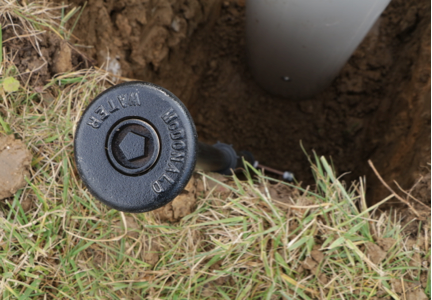Parts that are buried underground live a tough life. Having to function and thrive under fluctuating temperatures, ground movement, differing ground depths, and soil conditions are just a number of concerns. Most water works parts are intended to survive up to a century in the underground soil. However, fulfilling this life expectancy becomes unrealistic when resistance against corrosion isn’t taken into account.
Corrosion is responsible for increasing the decay and deterioration of most metals by eating away at the wall thickness. For water works parts, this not only decreases the lifespan of the product but also can create a leak point through corrosion-created cracks. The severity and effect on water works pipes and parts may vary depending on a number of elements, such as the type of metal, the presence of water and moisture, and the temperature. However, what some don’t know is that the soil can also play a role.
When certain factors are present in soil, it too will become corrosive, which in turn can seep into water works pipes and fittings. While plants and animals have the ability to adapt to soil corrosiveness, manmade structures do not. In fact, each year in the United States, expansive soils cause between $2 to $6 billion of damage to roads, buildings, and other structures. By paying attention to the following conditions, one can anticipate the level of corrosion that soil contains:
- Aeration – Well-aerated soils provide lower corrosion levels as water can be moved out of the soil and into the air
- Soil type – Sandy soils provide the best possible drainage while clay soils create the worst
- Soil pH – Low soil pH leads to corrosion. In addition, more acidic soils with a pH that rests under five can lead to serious corrosion.
- Moisture content of the soil – Damp soils provide the water necessary in order for the corrosion process to begin
- Temperature – An increase in temperature will generally cause an increase in the corrosion rate
- Sulfate and salt levels – Presence of either of these makes soil more susceptible to corrosion
Manufacturers help protect against corrosion through the design and manufacturing process of their products. This is often done by applying certain coatings and paints, along with the choice of materials. For example, A.Y. McDonald’s telescoping curb box is produced with a material that makes it even more corrosion resistant than a standard iron curb box, evident in its tough polyethylene base and optional stainless-steel shutoff rod.
Between fluctuating temperatures, differing ground depths, ground movement, soil conditions, and vulnerability to corrosion, a poorly made product won’t be able to survive in the underground soil. When access to clean water is at stake, A.Y. McDonald finds it worth going the extra mile by creating corrosion resistant parts. While soil corrosion is just one concern, it’s another reason why not just anyone can be trusted to make water work for you and your community!


